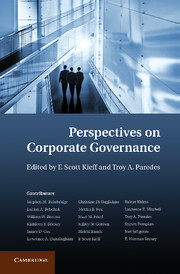Book contents
- Frontmatter
- Contents
- Contributors
- Acknowledgments and Dedication
- PERSPECTIVES ON CORPORATE GOVERNANCE
- Introduction
- PART ONE THE BOARD OF DIRECTORS AND THE CEO
- PART TWO THE WHY, WHEN, HOW, AND HOW MUCH OF EXECUTIVE PAY
- 4 Pay Without Performance: Overview of the Issues
- 5 Supersize Pay, Incentive Compatibility, and the Volatile Shareholder Interest
- 6 “Say on Pay”: Cautionary Notes on the U.K. Experience and the Case for Muddling Through
- PART THREE CONSTRAINING MANAGERS AND DIRECTORS: INVESTORS, SECURITIES REGULATION, AND THE MEDIA
- PART FOUR DELAWARE VERSUS CONGRESS: ON THE FEDERALIZATION OF CORPORATE GOVERNANCE
- PART FIVE COMPARATIVE CORPORATE GOVERNANCE
- Epilogue: Three Secular Trends of Corporate Law
- Index
- References
6 - “Say on Pay”: Cautionary Notes on the U.K. Experience and the Case for Muddling Through
Published online by Cambridge University Press: 04 August 2010
- Frontmatter
- Contents
- Contributors
- Acknowledgments and Dedication
- PERSPECTIVES ON CORPORATE GOVERNANCE
- Introduction
- PART ONE THE BOARD OF DIRECTORS AND THE CEO
- PART TWO THE WHY, WHEN, HOW, AND HOW MUCH OF EXECUTIVE PAY
- 4 Pay Without Performance: Overview of the Issues
- 5 Supersize Pay, Incentive Compatibility, and the Volatile Shareholder Interest
- 6 “Say on Pay”: Cautionary Notes on the U.K. Experience and the Case for Muddling Through
- PART THREE CONSTRAINING MANAGERS AND DIRECTORS: INVESTORS, SECURITIES REGULATION, AND THE MEDIA
- PART FOUR DELAWARE VERSUS CONGRESS: ON THE FEDERALIZATION OF CORPORATE GOVERNANCE
- PART FIVE COMPARATIVE CORPORATE GOVERNANCE
- Epilogue: Three Secular Trends of Corporate Law
- Index
- References
Summary
INTRODUCTION AND OVERVIEW
Executive compensation seems always on the public agenda. At a 2003 Columbia Law School conference that debated the newly published Pay without Performance by Lucian Bebchuk and Jesse Fried, an editor of Fortune magazine showed a series of magazine covers beginning with the early 1950s to illustrate the persistent fascination with the pay of the chief executive of large public companies. Excessive CEO pay led to tax law changes in the early 1990s. Large stock option payoffs and megagrants made for especially vivid magazine cover stories in the late 1990s. Golden parachute payouts to fired CEOs made for lurid headlines in the 2000s. The changing ratio in the compensation level of CEO versus line worker from 20 to 1 in the 1950s to 350 to 1 today has taken on traction in the political realm as well as the boardroom. Add to the uneasy contemporary mix the preening of hedge fund managers, whose billion-dollar annual paychecks dwarf the typical CEO package.
Thus, there are really two strands in the contemporary executive compensation debate. One is the pay-for-performance strand, which accepts that managers should be paid commensurate with performance but focuses on management's purported ability to extract compensation beyond an arm's-length bargaining outcome. The other is the social-responsibility strand, which focuses on the social demoralization and economic justice concerns that high levels of CEO compensation may raise.
- Type
- Chapter
- Information
- Perspectives on Corporate Governance , pp. 189 - 214Publisher: Cambridge University PressPrint publication year: 2010



